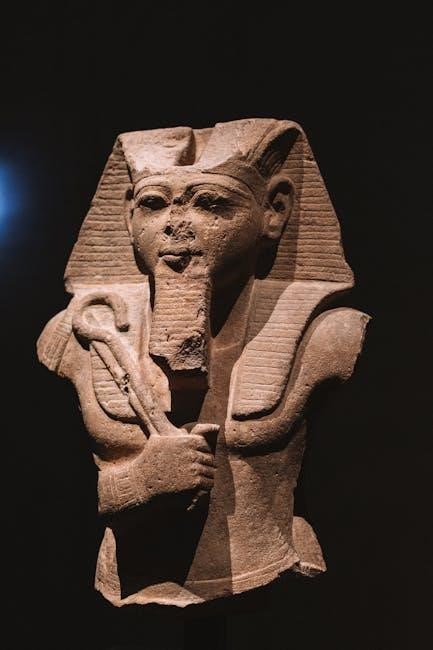Oedipus the King, a masterpiece by Sophocles,探索了命运、悲剧與人性的深刻主題。作為古希腊悲劇的傑作之一,它不僅展示了索福克勒斯的文學才華,也影響了西方文學的發展。這部作品通过奧伊狄浦斯的故事,揭示了人類面對命運時的無助與反抗,成为世界文学的经典。
1.1 Historical Context and Significance
Oedipus the King, written around 420 BC, is a cornerstone of ancient Greek literature. First performed in 429 BC, it reflects the cultural and philosophical values of Athens during its golden age. Sophocles’ masterpiece explores themes of fate, morality, and humanity, making it a pivotal work in the development of Western drama. Its enduring relevance underscores its historical significance as a timeless tragic narrative.
1.2 Sophocles and His Contribution to Tragedy
Sophocles, born in 496 BC, was a pivotal figure in Athenian tragedy, renowned for his dramatic innovations. He introduced the third actor and expanded the chorus’s role, enhancing dramatic complexity. Among his 120 plays, only seven survive, with Oedipus the King being his magnum opus. His works explore human suffering, moral dilemmas, and fate, leaving an indelible mark on Western literature and tragedy’s evolution.

Plot Summary of “Oedipus the King”
The city of Thebes faces a devastating plague. Oedipus, who solved the Sphinx’s riddle and became king, unknowingly fulfills an oracle’s prophecy by killing his father and marrying his mother.
2.1 The Oracle’s Prophecy and the Curse of Thebes
An oracle foretold that Oedipus, born to King Laius and Queen Jocasta, would kill his father and marry his mother. To prevent this, the infant Oedipus was abandoned. A plague ravages Thebes, and Oedipus, now king, seeks to lift the curse by solving the mystery of Laius’s death, unaware of his own true identity and the tragic fate awaiting him.
2.2 Oedipus’s Journey and the Riddle of the Sphinx
Oedipus, a stranger to Thebes, solved the Sphinx’s riddle, which asked: “What creature walks on four legs in infancy, two as an adult, and three in old age?” His correct answer, “man,” freed Thebes from the Sphinx’s terror. This triumph led to his ascension as king, marrying Jocasta, and ruling wisely, unaware of his true identity and the prophecy that awaited him.
Major Themes in the Play
The play explores fate, free will, and the inevitability of destiny. It highlights hubris, moral dilemmas, and the human condition, offering profound insights into universal themes.
3.1 Fate vs. Free Will
The play delves into the tension between fate and free will, as Oedipus’s life is shaped by prophecies and divine decrees. Despite his efforts to defy destiny, fate prevails, highlighting the inevitability of the gods’ will. This theme underscores the idea that human choices, though seemingly free, are ultimately governed by a larger cosmic design, leaving humanity grappling with its existential limits and the weight of predetermined outcomes.
3.2 The Tragic Hero Archetype
Oedipus embodies the tragic hero archetype, exemplifying nobility, flawed judgment, and a catastrophic downfall. His hubris and relentless pursuit of truth lead to his demise, evoking pity and fear in the audience. As a tragic figure, Oedipus’s suffering reveals universal truths about human frailty and the inevitability of fate, solidifying his place as one of literature’s most enduring tragic heroes.

Character Analysis
Oedipus, as the tragic hero, drives the play’s narrative, while Jocasta, Creon, and Tiresias play pivotal roles in unraveling the prophecy and fate surrounding Thebes’ cursed king.
4.1 Oedipus: The Tragic Hero
Oedipus embodies the classic tragic hero archetype, exhibiting hubris and a flawed yet noble character. His determination to uncover the truth and save Thebes underscores his noble intentions, while his inevitable downfall highlights the inexorable power of fate. As king, he solves the Sphinx’s riddle, showcasing his intellect, but ultimately succumbs to the prophecy, symbolizing the human struggle against destiny.
4.2 Jocasta: The Queen and Mother
Jocasta, as both queen and mother, plays a pivotal role in the tragedy. Her marriage to Oedipus, unaware of their familial bond, underscores the play’s dark irony. She embodies maternal love and royal duty, yet her desperate attempts to prevent the prophecy’s fulfillment ultimately fail. Her tragic end, upon discovering the horrifying truth, deepens the play’s emotional impact and highlights the devastating consequences of fate.

PDF Versions and Translations
Oedipus the King is widely available in PDF formats, with notable translations by F. Storr and David Grene. These versions are accessible online, preserving Sophocles’ timeless masterpiece for modern readers.
5.1 Popular Translations (F. Storr, David Grene)
Notable translations of Oedipus the King include those by F. Storr and David Grene. Storr’s version, available on the MIT Classics website, offers a faithful rendering of Sophocles’ original text. Grene’s translation, known for its clarity, is also widely acclaimed. Both translations preserve the play’s emotional depth and complexity, making them accessible to modern readers while maintaining the essence of the ancient Greek tragedy;
5.2 Availability of PDFs Online
Historical Background
Sophocles, born in Colonus near Athens around 495 BC, was a renowned Athenian tragedian. Oedipus the King premiered in 429 BC, showcasing his mastery of Greek tragedy.
6.1 Sophocles’ Life and Works
Sophocles, born around 495 BC in Colonus, Athens, was a prominent Greek tragedian. He revolutionized theater by introducing a third actor and scenic painting. Of his 120 plays, only seven survive, including Oedipus the King. His works are celebrated for their emotional depth and exploration of human suffering, solidifying his legacy as one of Greece’s greatest playwrights.
6.2 The Play’s Premiere and Reception
Oedipus the King premiered around 429 BC in Athens as part of a tetralogy. It won first place at the Dionysia festival, showcasing Sophocles’ mastery. The play’s exploration of fate and human suffering resonated deeply, making it a timeless classic. Its psychological depth and moral complexity continue to captivate audiences, solidifying its place in world literature.
Key Scenes and Symbolism
The Sphinx’s riddle and Oedipus’s triumphant answer symbolize wisdom and destiny. The plague in Thebes represents divine wrath, driving the plot’s urgency and Oedipus’s quest for truth.
7.1 The Blind Prophet Tiresias
Tiresias, the blind prophet, embodies spiritual sight versus physical blindness. His confrontation with Oedipus reveals the king’s unknowing fulfillment of the prophecy, symbolizing tragic irony. Despite his lack of vision, Tiresias sees the truth, while Oedipus remains metaphorically blind to his fate. This contrast underscores the themes of knowledge, ignorance, and divine will, making Tiresias a pivotal figure in the play’s dramatic unraveling.
7.2 The Climax: Oedipus’s Self-Blinding
Oedipus’s self-blinding marks the tragic climax, as he gouges out his eyes upon discovering the horrifying truth of his identity. This act symbolizes his inability to bear the reality of his actions and serves as a form of self-punishment. The physical blindness contrasts with his newfound emotional and psychological awareness, encapsulating the play’s exploration of human suffering and the inexorable nature of fate.
Legacy of “Oedipus the King”
Oedipus the King endures as a foundational work in Western literature, its themes of fate and human struggle continuing to resonate in adaptations and scholarly translations.
8.1 Influence on Western Literature
Oedipus the King has profoundly shaped Western literature, becoming a cornerstone of tragic drama. Its exploration of fate, morality, and human suffering influenced countless writers, from Shakespeare to modern authors. The play’s themes of destiny and the tragic hero archetype remain central to literary analysis, ensuring its enduring relevance in academic and cultural contexts worldwide.
8.2 Modern Adaptations and Interpretations
Oedipus the King continues to inspire modern adaptations across media, from film to stage productions. Its timeless themes of fate, identity, and moral conflict resonate in contemporary reinterpretations, often exploring psychological depths or societal issues. Translations like those by F. Storr and David Grene have made the play accessible, ensuring its relevance in today’s cultural and academic discourse, bridging ancient and modern storytelling.

Critical Analysis
Oedipus the King is celebrated for its exploration of human psychology and morality, with Freud’s Oedipus complex being a landmark interpretation.
9.1 Freudian Interpretations of the Oedipus Complex
Sigmund Freud introduced the Oedipus complex, inspired by Sophocles’ tragedy, describing unconscious desires for the opposite-sex parent and rivalry with the same-sex parent. This psychological concept, rooted in Oedipus’s unknowing fulfillment of the oracle, explores primal human conflicts, making the play a cornerstone of psychoanalytic theory and modern literary analysis.
9.2 The Play’s Relevance in Modern Times
Oedipus the King remains a timeless exploration of human dilemmas, resonating with modern audiences through its themes of identity, morality, and the struggle against destiny. Its universal appeal lies in its ability to reflect contemporary societal and psychological issues, making it a cornerstone of literary and philosophical discussions in the 21st century.
Oedipus the King remains a profound exploration of human nature, destiny, and morality. Sophocles’ masterpiece continues to captivate audiences, offering timeless insights into universal struggles.
10.1 The Timeless Appeal of “Oedipus the King”
Oedipus the King endures as a timeless masterpiece, captivating audiences with its universal themes of fate, free will, and human frailty. Sophocles’ exploration of the tragic hero archetype resonates across centuries, offering profound insights into morality, justice, and the complexities of human nature. Its enduring relevance lies in its ability to evoke empathy and reflection, ensuring its continued influence in literature, art, and modern adaptations.
10.2 Final Thoughts on Sophocles’ Masterpiece
Oedipus the King remains a cornerstone of Western literature, offering profound insights into human nature, fate, and morality. Sophocles’ masterful portrayal of the tragic hero archetype continues to captivate audiences, while its exploration of universal themes ensures its timeless relevance. The play’s influence extends beyond literature, shaping psychological theory and inspiring countless adaptations, solidifying its legacy as a work of enduring brilliance and emotional depth.
